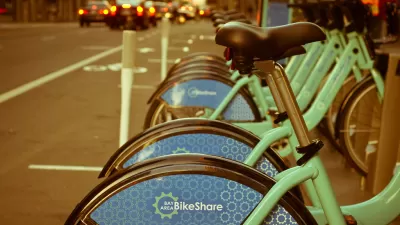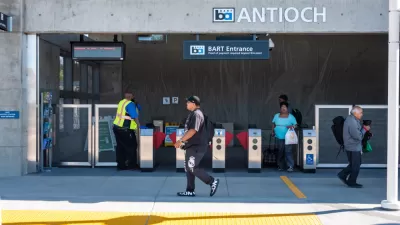Depending on what media you're reading, Bay Area Bike Share is either off to a "fast start" or an "underwhelming start". We give both reviews - you judge. In addition, Sacramento looks toward BABS as a model, and expansion within SF will be proposed.

According to Streetsblog SF editor Aaron Bialick's analysis of "the first usage data from Bay Area Bike Share, the number of trips in the first 12 days is underwhelming compared to bike-share launches in New York or Washington, DC."
[The data] works out to about 0.92 trips per bike per day. It doesn’t quite stack up to NYC’s Citi Bike, which hit 1.24 trips in the first two days, or DC’s Capital Bikeshare, which had 1.05 trips in its first 10 days. Of course, it’s still very early, and these usage numbers will change. On peak days, Citi Bike now hits seven trips per bike and on routine days averages between five and six trips per bike.
For a more positive evaluation, SF Examiner's Jessica Kwong provides basic subscription data and interviews with key people.
From its launch Aug. 29 through Sept. 16, Bay Area Bike Share has recorded 14,591 trips... across San Francisco, Redwood City, Palo Alto, Mountain View and San Jose. The total annual membership count was at 2,080, and the number of one- to three-day per-week users was 3,411.
Managing the pilot program is the Bay Area Air Quality Management District. Karen Schkolnick, the District Grants Programs Manager said, "The San Francisco system is very popular. We're seeing a lot of activity along the Market Street corridor and usage pretty much systemwide."
The pilot fleet size — 700 bikes total, with half in San Francisco — is expected to grow to 1,000 bikes in all, with 500 in The City. It pales in comparison to growth in Chicago, which started with 700 bikes in July and now has 3,000. New York also launched a network this summer, using private funds and 6,000 bikes.
Unlike other big city bike share programs, BABS is regional - including San Jose and the three suburban cities of Redwood City, Palo Alto, and Mtn. View. All five cities are connected by the peninsula's commuter rail service, Caltrain, with BABS stations accessible at or near the rail stations.
Sacramento observed that nexus to rail, and like it. Jared Goyett of the Sacramento Press writes that the capital city's bike share program, "may be a few years away, but planners are starting off by thinking big: They intend for Sacramento's bike-share program to connect with the one launched last month in the San Francisco Bay Area."
The goal is to eventually have bike-share kiosks, where people can rent bikes with the swipe of a card, all along Amtrak's Capitol Corridor route, creating a line of stops with bike access from San Francisco to Sacramento.
As in the Bay Area, the region's air quality management district is playing a key role.
Larry Greene, the executive director of the Sacramento Metropolitan Air Quality Management District, which is overseeing the program, told supporters about the goal to connect the two bike-share programs during a fundraiser for bike share held at Blackbird Kitchen & Bar on Sept. 18. He said the details of the program, including the funding and timing, will be released in three to four weeks, once the district completes the business plan.
Finally, Lee Romney of the Los Angeles Times, writes that San Francisco Supervisor Scott Wiener wants to expand BABS within his city "to truly reap the full benefits of this program – like reducing traffic, improving public transit and stimulating the local economy – and to ensure its viability".
He plans to call on the city’s Municipal Transportation Agency at the October hearing to provide data on the pilot program including “number of rides, rides per bike, and membership totals,” and provide expansion plans for “a full build-out of the system, including cost, locations, and funding strategy.”
FULL STORY: Bay Area Bike Share Off to Underwhelming Start, Early Usage Data Shows

Maui's Vacation Rental Debate Turns Ugly
Verbal attacks, misinformation campaigns and fistfights plague a high-stakes debate to convert thousands of vacation rentals into long-term housing.

Planetizen Federal Action Tracker
A weekly monitor of how Trump’s orders and actions are impacting planners and planning in America.

San Francisco Suspends Traffic Calming Amidst Record Deaths
Citing “a challenging fiscal landscape,” the city will cease the program on the heels of 42 traffic deaths, including 24 pedestrians.

Defunct Pittsburgh Power Plant to Become Residential Tower
A decommissioned steam heat plant will be redeveloped into almost 100 affordable housing units.

Trump Prompts Restructuring of Transportation Research Board in “Unprecedented Overreach”
The TRB has eliminated more than half of its committees including those focused on climate, equity, and cities.

Amtrak Rolls Out New Orleans to Alabama “Mardi Gras” Train
The new service will operate morning and evening departures between Mobile and New Orleans.
Urban Design for Planners 1: Software Tools
This six-course series explores essential urban design concepts using open source software and equips planners with the tools they need to participate fully in the urban design process.
Planning for Universal Design
Learn the tools for implementing Universal Design in planning regulations.
Heyer Gruel & Associates PA
JM Goldson LLC
Custer County Colorado
City of Camden Redevelopment Agency
City of Astoria
Transportation Research & Education Center (TREC) at Portland State University
Jefferson Parish Government
Camden Redevelopment Agency
City of Claremont



























